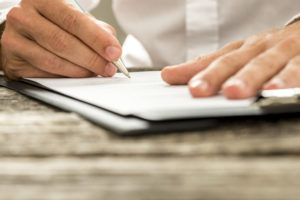 Do I really need an estate plan? This is one question we hear from clients on a regular basis. While it could be easy to say you could just chance it, but really there are many very good reasons as to why you do need a well-established estate plan. Beyond providing financial support and stability for your loved ones and preserving your wealth for those who come after you, an estate plan can help you to ensure that your wishes are followed. This can mean whether you’ve passed on or if you are unable to manage your affairs. (Little hint – having both a living will and power of attorney is a must).
Do I really need an estate plan? This is one question we hear from clients on a regular basis. While it could be easy to say you could just chance it, but really there are many very good reasons as to why you do need a well-established estate plan. Beyond providing financial support and stability for your loved ones and preserving your wealth for those who come after you, an estate plan can help you to ensure that your wishes are followed. This can mean whether you’ve passed on or if you are unable to manage your affairs. (Little hint – having both a living will and power of attorney is a must).
Dying without an estate plan can leave things in flux. Survivors at times may run into situations where misunderstanding and/or confusion over your wishes may be a problem when there is no clear plan. This can happen when you may not have left clear instruction on whether your life insurance policy or retirement plan beneficiaries are still the ones you still want to benefit from such. An estate plan can help avoid issues like this by laying out your expectations as to how your assets will be distributed. You can remove any questions which in turn will help to ensure that your assets are distributed in a timely manner. This can also help to cut down on the potential for legal issues.
Another benefit to having an estate plan is that you can save your loved ones from having to spend tons of money. You could make sure that they have enough money to cover expenses. This in turn could help to prevent the need to sale off your assets in order to meet those costs. You can also help to minimize the tax burden that can often accompany the transfer of assets.
An estate plan is all about peace of mind. Whether it’s your own peace of mind in knowing that your beneficiaries are being provided for according to your wishes or in knowing that your hard-earned assets are being distributed in the manner of your choosing (whether to loved ones or to a favorite charity) having an estate plan in place is a must. This raises an important question… where do you start?
The first step is to consider your assets. Make an inventory along with an estimated value for each. Take time to think about who you want to include as beneficiaries and to what extent you wish to provide for them. Once you’ve done this, the next step is to find the right help in establishing your estate plan. Could you do it yourself? Possibly. However, when you choose the DIY option you take a risk. Rather than take a chance like this, it is a good idea to meet with an experienced estate planner who can help make sure you are covering all your bases.
Want more info on how we can help you create an estate plan or modify an existing one? Click here to Contact Us today.




